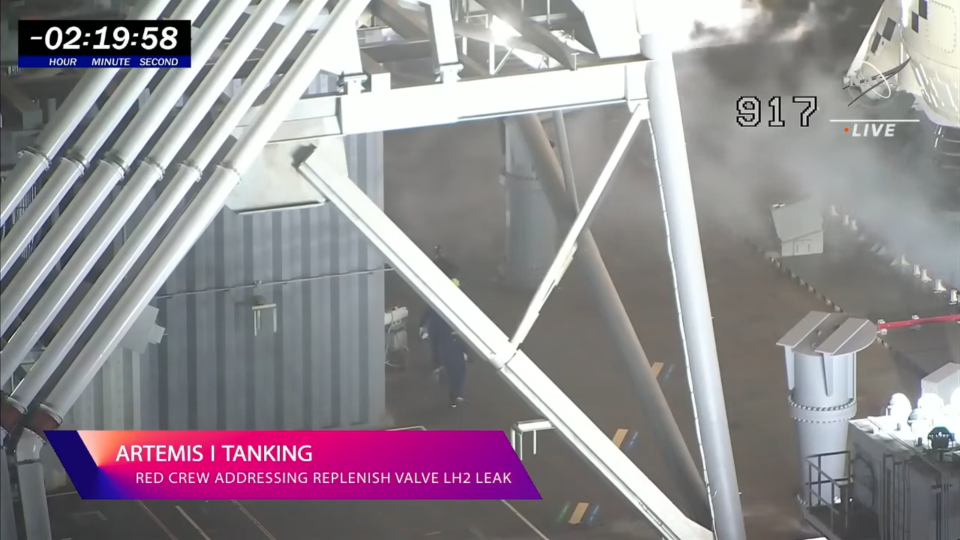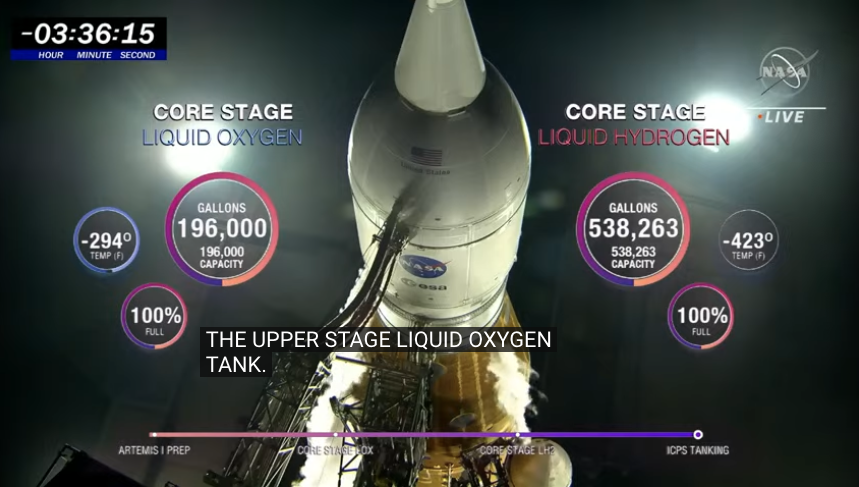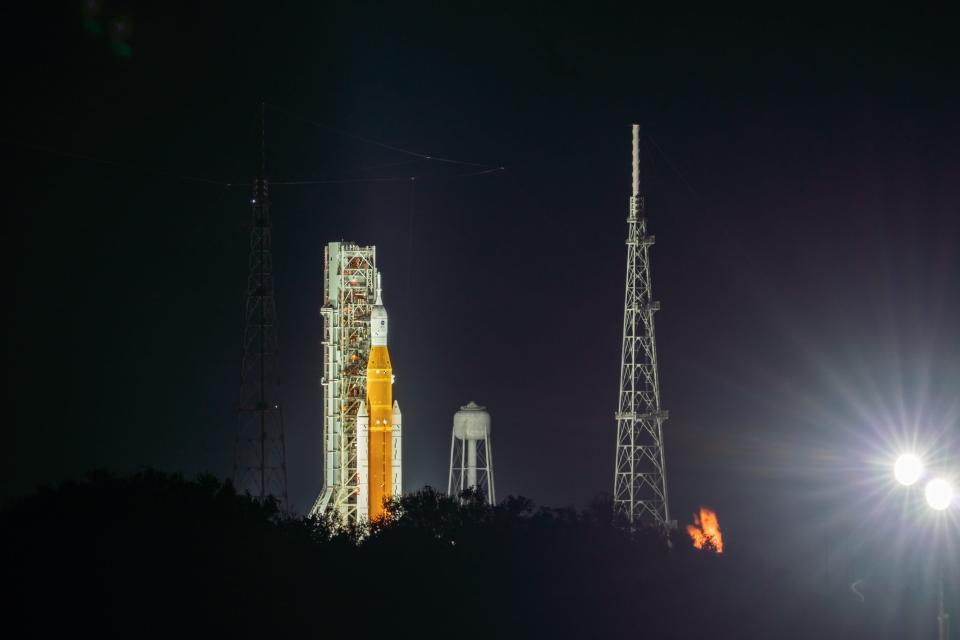Updates: NASA launches its mega Artemis I moon rocket from Florida
Space is important to us and that’s why we're working to bring you top coverage of the industry and Florida launches. Journalism like this takes time and resources. Please support it with a subscription here.
---
Update: LIFTOFF of NASA's Artemis I mission from Kennedy Space Center on a 26-day mission to the moon and back! The historic launch marks the first under the new moon-focused Artemis program. Read our full post-launch story here.
---
Watch live as NASA targets between 1:04 a.m. and 3:04 a.m. Wednesday, Nov. 16, for the debut launch of its massive Space Launch System rocket and Orion capsule from Kennedy Space Center in Florida.
Teams supporting the agency's Artemis I mission to the moon and back have two hours to launch the 322-foot rocket from pad 39B, potentially kicking off a 25-day mission if all goes according to plan. Weather is 80% "go."
Follow live updates below (for real-time updates, visit this link):
Liftoff of Artemis I!
1:44 a.m. EST: LIFTOFF of NASA's Artemis I mission to the moon!
NASA 'GO' to launch Artemis I mission
Poll complete. NASA is GO for launch of Artemis I!
NEW LAUNCH TIME: 1:47 a.m. EST.
Previous hurricane issue crops up again
1:20 a.m. EST: Okay. A few updates.
First, NASA still needs to test the flight termination system after a radar site went down due to a bad network connection. The issue is resolved, but testing will make sure the rocket can be destroyed in the event of an emergency – obviously a critical step.
Second, managers just said a previously reported issue – the stripping of a caulk-like material on the Orion capsule during Hurricane Nicole – has cropped up again. More of the room-temperature vulcanization material, or RTV, has come off the Orion spacecraft, increasing the likelihood of it breaking off during flight and striking other portions of the rocket below. Teams have cleared this issue and are confident it won't damage the rocket since RTV is soft and pliable. But it's something to note, especially going into a major launch attempt.
Read more of our reporting on the RTV issue here.
NASA delaying tonight's SLS launch
1 a.m. EST: NASA is now "slipping indefinitely into the hold." That's a roundabout way of saying managers do not yet know how much time is needed to make it through the countdown tonight. Probably fair to say there will be a delay to at least 1:30 a.m. EST.
Radar station issue fixed
12:25 a.m. EST: Fueling operations at pad 39B continue as planned. Both the SLS rocket and its ULA-built upper stage are handling liquid hydrogen and oxygen without issue, which is a significant milestone in and of itself considering previous launch attempts didn't get this far.
On the radar station issue, the Space Force told NASA affected networking hardware was replaced and teams are moving forward. But because it's a critical system – especially in the event of an emergency and the rocket needs to be destroyed – testing needs to be done.
It is safe to assume mission managers will choose a new launch time soon. Tonight's window will stay open until 3:04 a.m. EST.
Hydrogen fix OK; radar station still down
11:55 p.m. EST: Good news: the "red team" did successfully fix the hydrogen leak issue at pad 39B. Fueling is continuing as planned, so we appear to be solid on that front.
On the Space Force side of things, teams continue to replace a bad batch of networking hardware tied to a radar tracking station. Tracking rockets after liftoff is critical, especially since we're on the verge of a night launch and lack daytime visibility.
Space Force reports networking issue
11:55 p.m. EST: The Eastern Range reports an Ethernet switch, or basically networking hardware, needs to be swapped out to fix the issue. That could take up to 70 minutes – not a good sign, especially since we're an hour and 15 minutes to the opening of the window. Stay tuned.
New issue makes range 'no-go'
11:25 p.m. EST: The Eastern Range, overseen by the Space Force, is now NO-GO due to a radar site being down, NASA's launch commentator says. Teams are working to troubleshoot. BUT the hydrogen-related fix appears to be holding and the propellant is flowing again to top off the tank.
Stay tuned.
Space Coast parks crowded for Artemis
11:15 p.m. EST: Quick update from Brevard County Emergency Management, which supports launch operations – especially if something goes wrong. If you haven't left the house yet:
These parks are packed for the NASA Artemis launch. Best to avoid these areas if you're headed out: Rotary Riverfront, Parrish, Max Brewer Bridge, and Sand Point Park in Titusville, and Veterans Memorial Park on Merritt Island.
NASA team completes hydrogen repair
11 p.m. EST: The red team has completed tightening nuts on a hydrogen fueling line. Now to see if the fix holds when launch engineers resume pumping hydrogen into SLS' core stage.
Team still repairing issue at pad
10:30 p.m. EST: The red team, seen next to the rocket's four RS-25 main engines below, is still working the hydrogen leak issue at pad 39B. There is a chance this could be resolved in time for a launch tonight. Window runs to 3:04 a.m. EST.

NASA will send repair team to pad 39B
9:55 p.m. EST: Sounds like NASA will indeed send the “red team” into the pad area to fix the LH2 replenish/top-off leak. The plan: two technicians and a safety leader will go in two vehicles, tighten the “packing nuts,” then leave ASAP. Will take about 15 minutes.
NASA might send team to pad 39B
9:30 p.m. EST: Sounds like NASA is considering sending the "red team" into pad 39B to investigate the issue and essentially tighten some bolts related to the hydrogen system. Stay tuned.
Tracking hydrogen replenishment issue
9:20 p.m. EST: Teams in KSC's Launch Control Center are keeping an eye on what appears to be a hydrogen system leak at pad 39B. This is related to an air-exposed sensor, so its threshold is low – that sensor detected a 1% concentration of hydrogen outside the rocket, meaning there is a decent leak somewhere down toward the ground. Teams consider 1% to be the threshold.
Stay tuned.
Weather still solid for SLS launch
9 p.m. EST: Space Force weather forecasters say the "go" probability for tonight's Artemis I launch now sits at 90%, which is a 10% improvement over the previous report. Expecting another update in about an hour.
Otherwise, teams are not seeing any technical issues with the rocket at pad 39B and the last stages of fueling are continuing as planned.

Countdown continuing smoothly
8:30 p.m. EST: Teams continue to prep the 322-foot Space Launch System rocket at Kennedy Space Center ahead of liftoff in four-and-a-half hours. The rocket's Boeing-built core stage is fully fueled and in good shape; upper stage fueling is next. Still working toward liftoff at 1:04 a.m. EST, which is the opening of tonight's two-hour window.

Welcome to live coverage; NASA on target for launch
8 p.m. EST: Welcome to our live coverage from Kennedy Space Center, where NASA's Space Launch System rocket is almost fully fueled at pad 39B ahead of liftoff at 1:04 a.m. EST Wednesday. Despite the fact that Hurricane Nicole swept through the Space Coast last week and some rocket-related damages were reported, SLS is moving through the count without issue. That's contrary to three previous attempts that were called off due to technical issues.
Stay tuned.
This article originally appeared on Florida Today: Updates: NASA launches its mega Artemis I moon rocket from Florida
